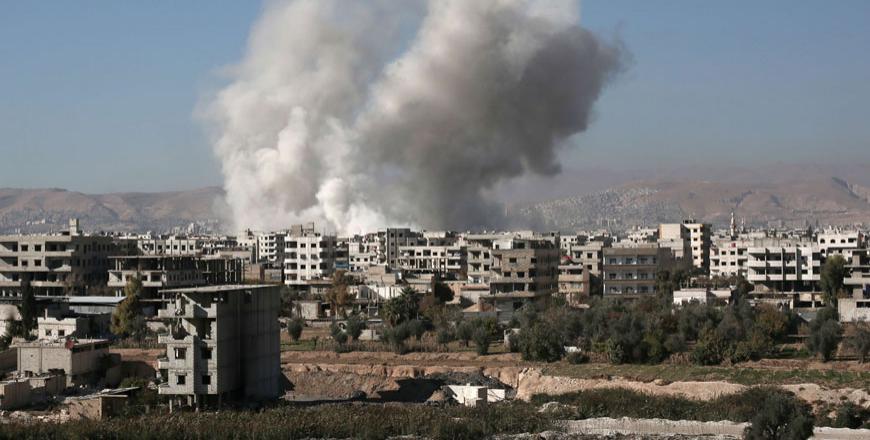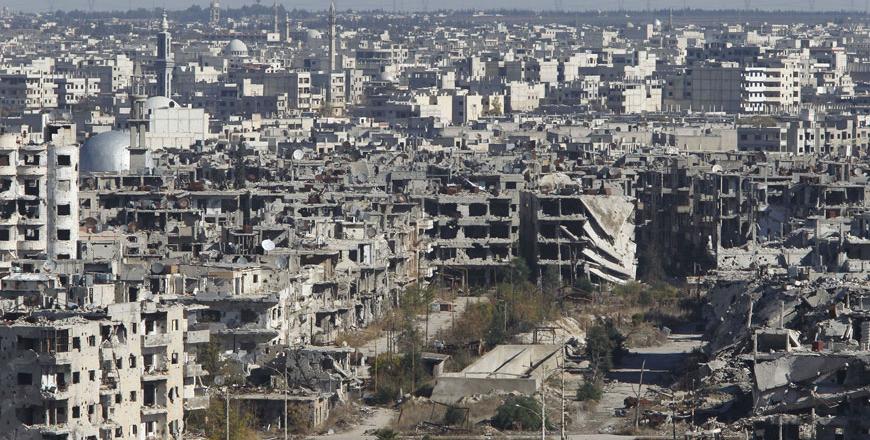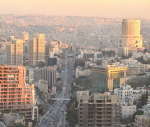You are here
Syria’s divided opposition seeks to unify stance
By AFP - Dec 06,2015 - Last updated at Dec 06,2015

Smoke billows from buildings following a reported air strike in Damascus’ rebel-held suburb of Zamalka on Sunday (AFP photo)
DUBAI — Syrian opposition groups gather in Saudi Arabia Tuesday to unify their stance ahead of potential talks with the regime of President Bashar Assad, whose fate remains a point of contention.
It will be the first time representatives of the political opposition and military factions fighting the regime have come together since the conflict began in 2011.
Saudi Arabia is hoping to unite the opposition ahead of talks between parties to the conflict, which world powers hope to hold before January 1.
Some hundred representatives are likely to attend the meeting on Wednesday, including Saudi-backed Jaish Al Islam (The Army of Islam), an amalgam of factions that include hardline Islamists, which is not listed as a terrorist group.
The invitees do not include those considered to be "terrorist", such as the Daesh terror group and Al Qaeda's Syrian affiliate Al Nusra Front.
Kurdish factions are also not invited.
“The mission is difficult and risky,” said Samir Nashar, a member of the Istanbul-based National Coalition, the main Syrian opposition grouping.
He said the aim was to “agree on a common and clear position concerning the future of Syria, the transition and the stance on [the fate of] Bashar Assad”.
Last month, top diplomats from 17 countries — including key international backers and opponents of Assad — met in Vienna in search of a political solution to Syria’s war, which has seen 250,000 people killed since March 2011.
‘Core differences’ over Assad
Those nations included the United States and Saudi Arabia which back the opposition, and Russia and Iran, Assad’s main supporters.
They agreed on a fixed calendar for Syria that would see a transition government set up in six months and elections within 18 months.
Speaking of “core differences” over Assad’s fate, Nashar said he feared that “some groups close to states supporting the regime, could demand that Assad stays during the transition period”.
“This risks causing the failure of the meeting,” he said.
Groups supported by the United States, Saudi Arabia and Qatar demand Assad’s rapid departure, a condition that Iran and Russia continue to oppose.
“The opposition still demands the departure of Assad at the beginning of the transition period,” insisted Ahmed Ramadan, another National Coalition member.
“We cannot negotiate before agreeing in principle and having a date for the departure of Assad,” he said.
Nashar said that although a ceasefire is a must, that “could not mean that we accept that Bashar Assad could stay during the transition [only] because he will stop killing”.
Meanwhile, the Syria-based opposition which is tolerated by the regime argues that Assad’s fate should be decided by the Syrian people.
“There is an international agreement that this issue should be decided by the Syrians,” said Hassan Abdel Azim, who heads the National Coordination Committee for Democratic Change.
Push for a ceasefire
The recent deadly attacks by Daesh, mainly those in Paris last month, appear to have softened the positions of Western countries on Assad, especially France.
“A united Syria implies a political transition. That does not mean that Bashar Assad must leave even before the transition, but there must be assurances for the future,” French Foreign Minister Laurent Fabius said in an interview published on Saturday.
His American counterpart John Kerry also urged Saudi Arabia and the United Arab Emirates to convince Syrian rebel groups to negotiate a ceasefire with Damascus, in an effort to isolate extremists.
A US-led coalition, including several Gulf and other Arab countries, in September 2014 launched an air campaign against Daesh.
Moscow mounted its own campaign in September this year, but the National Coalition accuses Russia of bombing rebels battling Assad’s regime.
Haytham Manna, co-founder of the opposition coalition Cairo Conference, said 20 members of his group would join next week’s talks.
Saudi Arabia, meanwhile, hopes to come out of the meeting with a “unified Syrian opposition, and to stop the Russians and others from claiming there is no Syrian opposition that is unified”, according to Saudi columnist Jamal Khashoggi.
This will ease the process of getting rid of Assad, he said.
Regional rival Iran, however, has warned that the Saudi conference would breach declarations made by both sides in Vienna seeking a list of mutually approved opposition groups.
Related Articles
RIYADH — Syria's splintered opposition was gathering in Saudi Arabia on Tuesday for difficult discussions on forming a united front in poten
RIYADH — A meeting between Syrian opposition groups in Riyadh has ended in stalemate, a member said Tuesday, with the fate of President Bash
RIYADH — Syria's main opposition groups agreed at unprecedented talks Thursday to negotiate with President Bashar Assad's regime but insiste

















